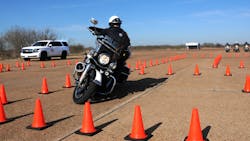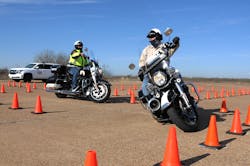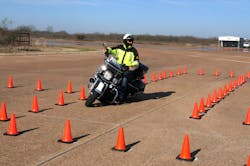Get Your Motor Running: The Importance of Motorcycle Training for Officers
In March, Harley-Davidson and the Texas A&M Engineering Extension Service (TEEX) announced a new partnership to provide law enforcement officers across the county with a new standard for motorcycle training. “We’ve been training vehicle operations for quite a while. Recently, the state’s motorcycle safety training program was transferred to us,” says Dr. John M. Ray, PhD, Director of the TEEX Institute for Law Enforcement and Protective Services Excellence. “That’s when Harley-Davidson got wind of that and we entered into talks with them and entered terms.”
TEEX previously offered motorcycle training, but the program was phased out about 17 years ago, according to Ray. “It had always been on our radar to reactivate our motor officer training program. When we were approached by Harley-Davidson, we were more than happy to team up to do this training.”
Ray, who was in policing for 33 years and spent the last half of that time as an administrator, oversaw several motor units and says that the Harley-Davidson school was always considered to be the “gold standard” when it came to motorcycle training for officers. “I’m really pleased that this very program that I sent so many officers to is now something that is in our area of responsibility.”
Although it’s based out of Texas, TEEX is a worldwide training organization offering training in various public safety fields. TEEX even has a fire training facility in the Middle East. “What we’re good at doing is developing training and taking it out,” he says. “That was the thing about this program before we became the home for it. It traveled the country and will continue to do so.”
TEEX and Harley-Davidson are hitting the ground running with the training program and are offering in-person classes in different locations throughout the year.Advantages of motor patrol
Motorcycles are one of the best kept secrets in law enforcement, Ray says, noting that as the roads become more congested, getting to a scene through crowded traffic can prove difficult. “With the change in urban design, you have cities that will often times block off streets and turn them into plazas. So these are places patrol cars can’t safely go. A bike is able to negotiate some of these new architectural features.”
John Young, an Agency Instructor with TEEX, says that while motorcycles can access areas patrol vehicles cannot, training needs to address challenges that arise when maneuvering the machines around obstacles and civilian vehicles on roadways. “We have very powerful motorcycles and we’re trying to enforce traffic laws for very powerful cars,” he says. “There’s a need for performance management and higher perforce skill training.”
Case in point, a 41-mile section of the toll road on Texas State Highway 130 has a posted speed limit of 85 mph—the highest posted speed limit in the United States. “That’s a brand new dynamic,” Young says. “We have higher speed limits that we have to deal with. We have limited access roadways where access to vehicles getting to an incident or a crash that is blocking traffic. It’s imperative that you get a unit there and are organizing movement in calling in whatever necessary needs for medical personnel and that sort of thing.”
Both men agree that the advantages gained through a motor unit far outweigh the challenges. “With the economy of bikes versus patrol cars and the flexibility and ease of deployment in large crowds and in tight spaces, it is something that an agency administrator who hasn’t considered it in while might want to take a look at it again,” says Ray.New technology & training
An increase in technology included on newer motorcycles has led to enhanced training for officers over the past several decades. “The technology has changed,” says Ray. “There have been a lot of advancements in safety. These bikes today that are being produced don’t perform like they did 20 years ago. Things that you would expect a bike to do, there are a number of safety features now.”
He pointed to the evolution of Anti-lock braking systems in motorcycles and how it has changed the performance of the bike from the way it was when he first began his career in law enforcement 30 years ago. “The technology is different, and getting a feel for how that technology works under performance conditions is critical.”
Young says that ABS braking was introduced by Harley-Davidson about 15 years ago and changed training because if an officer brakes into an ABS activation, they are actually over-braking. He also spoke about dependency on technology. If there is a failure and the officer has to revert back to manual-type braking, where there’s not ABS.
“We also have new cornering technology where a tire can’t slip or lock,” he says. “That’s important in cornering and you get used to having that ability. All of a sudden, for whatever reason, you may lose it. We need to be able to teach not only the old way without technology, but the new way with technology, with the fact not to become dependent on it.”
Ray says that the training has evolved and expanded from merely the physics of riding a motorcycle to learning how the various safety systems are going to perform under high-performance conditions. “These bikes will now do things for you that you wouldn’t expect. If you don’t know how to react, you will not be able to maximize the value of the bike,” he says.
“Here at TEEX, we are also home to the largest fire school in the nation and we are learning that there are paramedics now in certain areas of the country that are being deployed on motorcycles. So this training is also for them as well.”Officer safety concerns
Ray says that he had to reconstitute a motorcycle program at his last department that had been dormant for some time and had since sold all of its bikes. He says that the risk management piece was important, and that training is critical in managing the risk that is associated with motorcycles. “Speaking as an administrator, I will tell you that the most important concern is risk management. Going to a reputable program, a program that will stand behind the officers and is giving ‘gold standard’ training is critical.”
TEEX is currently in the process of getting the program IADLEST certified, which means it is acceptable in all 50 states. “You’re going to want to be able to prove that you’ve done everything that you could do to protect your officer and protect your jurisdiction,” says Ray.
Young says that the program is designed for the officer that has motorcycle experience in the off-duty or civilian world in order to transfer some of that knowledge to the police platform. At the same time, he noted that police motorcycles have some very unique characteristics compared to civilian motorcycles.
The combined center of gravity on a police motorcycle is much higher than civilian motorcycles since officers sit up much higher on the seat to provide more maneuverability. The clutches are heavier duty and the tires have a special bead that is designed not come off of the tire in a wreck or deflation situation. The motorcycle also are typically much more powerful than civilian models because they have special components in the motor.
“These motors are designed to be started at least 8 hours a day. That’s almost 100% of the duty cycle. So, they have larger oil coolers, and those sorts of things,” he says.
Ray pointed out that an advantage of TEEX’s partnership with Harley-Davidson is that officers are supplied with motorcycles when taking part in the training. “In our training program, if something happens to that bike, it’s not your department bike. It’s not the chief’s bike that needs to be fixed or repaired or trailered to the training site. You get another bike; Harley is on site. They get you another bike and continue to train while the mechanic on site fixes that bike and it goes back into the rotation to be swapped out if there should be another issue or failure. If a trainee lays the bike down, then there is another bike ready to go.”
The motorcycle operations program offered by TEEX and Harley-Davidson is offering Operator and Instructor sessions from May through October. Course information can be found at https://teex.org/program/motorcycle-operations/

Paul Peluso | Editor
Paul Peluso is the Managing Editor of OFFICER Magazine and has been with the Officer Media Group since 2006. He began as an Associate Editor, writing and editing content for Officer.com. Previously, Paul worked as a reporter for several newspapers in the suburbs of Baltimore, MD.







